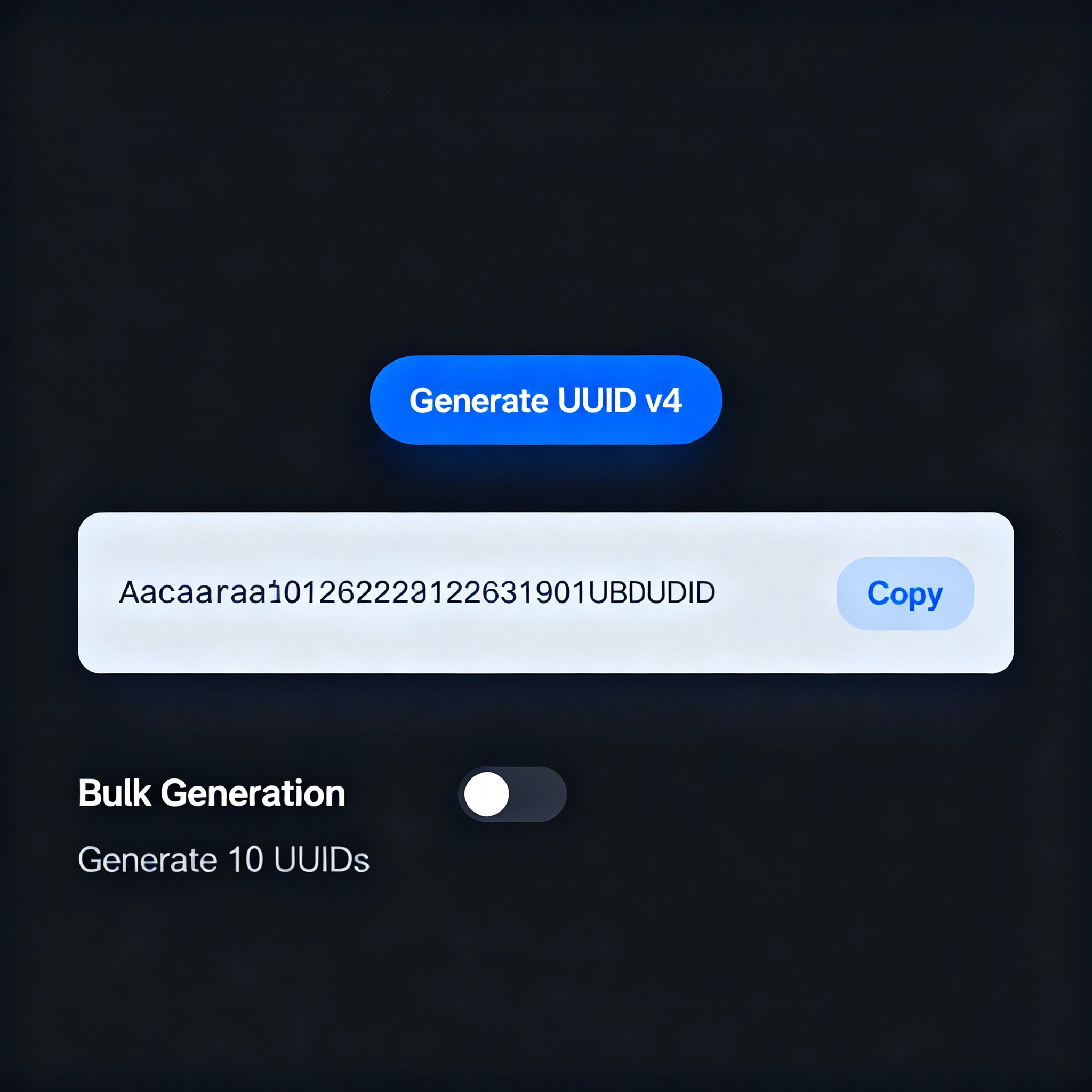
UUID v4 generator
Created on 22 October, 2025 • Generator tools • 96 views • 2 minutes read
Generating truly unique identifiers is critical in today’s digital world, supporting everything from database entries
UUID v4 Generator: Seamless Unique ID Creation for Secure Digital Systems
Introduction to UUID v4 Generator Tools
Generating truly unique identifiers is critical in today’s digital world, supporting everything from database entries and API transactions to file naming, user management, and security operations. A UUID v4 generator is a specialized utility designed to create Universally Unique Identifiers of “version 4”—randomly generated strings formatted for widespread use and global uniqueness. This tool ensures data integrity, collision-free resource identification, and robust system architecture for developers and organizations alike.
What Is a UUID v4 Generator?
UUID v4 Basics and Generation Process
A UUID (Universally Unique Identifier) is a 128-bit number used to identify information in computer systems. Version 4 (v4) UUIDs are created using random or pseudo-random numbers:
- Format: Standard UUIDs are presented in a 36-character string divided by hyphens (e.g., 123e4567-e89b-12d3-a456-426655440000).
- Randomized Generation: v4 UUIDs leverage randomness for creation, making accidental duplication astronomically improbable.
- Globally Unique: Suitable for use across distributed systems, networks, databases, and beyond.
A UUID v4 generator tool instantly produces these identifiers, ensuring each ID is unique and compliant with RFC 4122 standards.
Why Use a UUID v4 Generator?
Benefits for Development, Security, and Workflow
- Collision-Free IDs: Avoid ID clashes in relational and NoSQL databases, distributed systems, and APIs.
- Decentralized Generation: No need for a central authority; each system can autonomously create its own UUIDs.
- Best Practices Compliance: Meet recommended standards for unique keys in software frameworks and RESTful APIs.
- Secure File Naming: Safeguard confidential files or user sessions with non-guessable, random IDs.
- Sensible Logging and Tracking: Use UUIDs for robust audit trails, error tracking, and resource linking.
Common Use Cases
- Database Primary Keys: Assign unique record IDs in scalable databases.
- Session and Token Generation: Safeguard authentication with unguessable session or API tokens.
- Resource Naming: Assign globally unique names to files, images, or digital assets.
- Document Management: Prevent naming collisions and simplify asset referencing across platforms.
Features of the Best UUID v4 Generator Tools
Streamlined, Reliable, and Developer Friendly
- Bulk Generation: Produce multiple UUIDs at once for high-volume needs.
- Copy and Export Functions: Instantly copy or download generated IDs.
- Collision Checking: Assure uniqueness even across bulk batches.
- Integration Ready: Access via web UI, CLI, or API endpoints for seamless inclusion in automated workflows.
- No Logging or Tracking: Guarantee privacy and security with local or non-persistent operations.
- Custom Options: Optionally remove hyphens or change output formats.
SEO Tips for UUID v4 Generator Utility Pages
- Core Keywords: Use “UUID v4 generator,” “online UUID generator,” “generate random UUID,” “unique ID generator” in headings, text, and meta.
- Meta Optimization: Write clear meta descriptions that emphasize bulk generation, RFC compliance, and security.
- Guides and FAQs: Add step-by-step usage, security explanations, and integration examples.
- Schema Markup: Use software/application schema for rich search appearance.
- Clear UI and Docs: Screenshots, usage snippets, or sample outputs enhance trust and search relevance.
Conclusion: Power Up Projects with UUID v4 Generators
A UUID v4 generator is a must-have for any serious developer, system architect, or security-conscious organization. By offering robust, SEO-optimized features and integration guides, your UUID tool can attract global users, support critical infrastructure, and ensure unique ID management at scale.
Popular posts
-
GIF to BMPImage Manipulation tools • 583 views
-
GIF to WEBPImage Manipulation tools • 462 views
-
GIF-to-PNGImage Manipulation tools • 363 views
-
SHA-3/512 generatorConverter tools • 292 views
-
GIF to JPGImage Manipulation tools • 257 views